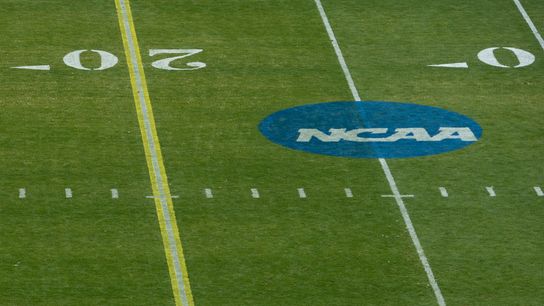A Pennsylvania jury has found that the NCAA is not liable for a former Division II linebacker's ALS diagnosis.
Matthew Onyshko played linebacker for California University of Pennsylvania from 1999 through 2003, and was diagnosed with ALS in 2008. The condition left him unable to continue working as a Pittsburgh firefighter.
In 2013, Onyshko sued the NCAA, arguing the organization was liable by intentionally withholding the risks of repeated blows to the head inherent to the game of football, which, the suit said, led to his ALS diagnosis. He says he suffered more than 20 unreported concussions during his time as a college football player. ALS is "a progressive neurodegenerative disease that affects nerve cells in the brain and the spinal cord," as defined by the ALS Association. ALS attacks motor neurons in the brain, severing the brain's ability to control muscle movement, which can eventually leave its victims unable to speak, eat and breathe -- all while leaving the brain's cognitive abilities intact.
“It’s the first of its kind,” Jason E. Luckasevic told the Pittsburgh Tribune-Review of the case. “This is the first ALS football case in the country. It’s kind of a big deal.” Luckasevic represented former Texas football player Greg Ploetz in his wrongful death suit against the NCAA, which ended in a settlement last June. Dr. Bennet Omalu, whose research discovered CTE, testified on Onyshko's behalf.
Onyshko, who is married with two children, utilizes an electric wheelchair and used a computerized device controlled by eye movement to provide testimony in the trial. His camp sought $9.6 million in compensatory damages, but the jury last week sided on a 10-2 basis on behalf of the NCAA.
“Obviously the jurors deliberated for some seven and a half hours, so there was a lot of fighting going on in that room, it sounds like, and at least two jurors believed in our case and others at some point were persuaded," another of Onyshko's attorneys, Eugene Egdorf, told the Washington County Observer-Reporter.
“We appreciate the jury’s thoughtful consideration of the issues presented in this case,” the NCAA said in a statement.
Though the case ended in the NCAA's favor, Onyshko's camp said after the trial it is not done pursuing the NCAA's liability in its client's condition. Egdorf told the Observer-Reporter his team plans to appeal the verdict and will file a wrongful death suit against the NCAA upon Onyshko's passing.
